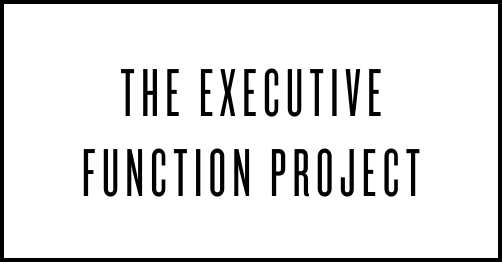What is Executive Function, and Why Does It Matter?
Mar 04, 2024
Executive function, a cognitive process that enables individuals to plan, organize, and execute tasks includes problem-solving, decision-making, working memory, attention, and self-control. Such skills are crucial for achieving goals and interacting effectively with others. Understanding the executive functions is essential for children and adults and affects our daily lives in ways we may not realize. Here, we explore the essential role of executive function and its impact on our lives, leading to academic as well as personal and professional achievements.
A Working Definition
Our working definition of Executive Function is taken from George McClosky; “The directive capacities that are responsible for a person's ability to engage in purposeful, organized, strategic, self-regulated, goal-directed processing of perceptions, emotions, thoughts, and actions" (McClosky, 2009).
“As is the case with many of our abilities, there are two main contributions to the development of executive skills-biology and experience. In terms of the biological or neurological contribution, the potential for executive skills is essential innate, already part of the brain’s wiring at birth,” according to Smart but Scattered Teens (Guar, Meltzer, & Guar (2013). They add, “Naturally at birth, executive skills, like language exist only as potential. That means that the brain has within it the basic biological equipment for these skills to develop, but several factors can influence how these skills develop.”
"Much education can and should occur in schools and other formally designated community institutions. However, the world beyond the schoolhouse is critical to education, and the traditional and new media are more important than ever."
- Howard Gardner

The Impact on Daily Living
As you may imagine, birth trauma, medical diagnoses, and injuries that affect the brain could limit a person’s ability to develop high level executive skills. Additionally, executive functions develop across the lifespan, and will vary by both internal and external factors, outside influences, interventions, and changes to one’s environment.
When your environment changes, your skillset may need to adapt to new rules, regulations, and expectations. If you were to change jobs, you might need to adjust your daily commute by taking the train instead of your car. If you experience the loss of a loved one, you may struggle with your normally in-tact executive functions due to emotional dysregulation. Any change to you, your mood, your thoughts, or to your physical environment will ask you to revisit and potentially re-learn new ways of planning, organizing, executing, and negotiating your day-to-day life.
Regarding academic success, having solid executive function skills helps in planning effective study strategies, time management, problem-solving, and navigating social relationships with teachers and peers. In the workplace, individuals with well-developed executive function abilities tend to show higher productivity, better task performance, and greater adaptability. Additionally, executive functions are critical in building and supporting healthy personal relationships, enabling us to communicate effectively, resolve conflicts, and regulate our emotions.
Development of Executive Function Skills
Executive function skills develop in early childhood and progress through adolescence and adulthood. It is widely reported that the first signs of infants using executive functions begin at 6-12 months. Later in life, we may see a cognitive decline in working memory, information processing, and word retrieval, therefore; we can expect to see a decline in executive skills. Since brain development, particularly the frontal lobe, continues to develop into late adolescence and early adulthood, pre-teens and teens may have difficulty making good decisions, organizing their spaces, keeping track of their homework and afterschool activities. One area of executive function that teens find particularly challenging is emotional control.

What are the Executive Functions
Executive functions encompass a comprehensive set of cognitive processes that play a pivotal role in guiding our behaviors, decision-making, and overall self-regulation. While models may slightly vary in their categorization, the following is a more detailed exploration of the commonly acknowledged 12 executive functions:
➡️ Inhibition: This involves the cognitive ability to control impulsive responses and resist distractions. It's the mental break that helps individuals think before acting.
➡️ Shift: The ability to flexibly switch between different tasks or perspectives, showing cognitive adaptability and mental agility.
➡️ Emotional Control: The nuanced skill of managing and regulating emotions in various situations, promoting emotional intelligence, emotional regulation and resilience.
➡️ Initiation: The cognitive function that enables individuals to independently initiate tasks without relying on external prompts or cues; displaying self-motivation.
➡️ Working Memory: This function involves holding and manipulating information in the mind for short-term use. It’s crucial for tasks that require active mental engagement.
➡️ Planning and Organization: The executive function of strategizing and organizing tasks effectively, ensuring a systematic approach to goal achievement.
➡️ Time Management: The ability to manage time efficiently, prioritize tasks, and distribute resources effectively to meet deadlines and achieve aims.
➡️ Goal-Directed Persistence: This executive function emphasizes the sustained effort towards a goal, even in the face of obstacles or challenges, highlighting resilience and determination.
➡️ Flexibility: Cognitive adaptability comes into play here, allowing individuals to adjust strategies and responses in response to changing situations or added information. This plays out in many different environments over the life span.
➡️ Metacognition: This involves being aware of one's thought processes, reflecting on cognitive functions, and having the ability to check and regulate one's own thinking.
➡️ Task Monitoring: The executive function of checking one's progress on ongoing tasks, evaluating success, and adjusting as needed for the best outcomes.
➡️ Stress Tolerance: This crucial executive function focuses on an individual's ability to cope with stress and adapt to challenging situations, highlighting emotional resilience.
Understanding and developing these executive functions are fundamental for navigating the complexities of daily life, fostering cognitive flexibility, and promoting adaptive behavior in various contexts. As individuals further explore these cognitive processes, they can enhance their overall executive functioning and contribute to their personal and professional success.
Practical Tips for Enhancing Executive Function
Individuals can undertake specific measures to augment their executive function capabilities. These measures can be practical and effectively enhance the individual's cognitive abilities. One can enhance their working memory and cognitive flexibility through puzzles, brain games, and critical thinking exercises. Planning and organizing skills can be improved through planners, creating to-do lists, and breaking large tasks into smaller, manageable chunks. Effective time management and avoiding distractions are also essential to support focus and to maximize productivity.
"When they use strategies that address the core executive function processes, they also become independent learners and flexible thinkers, and can more easily bypass their weaknesses while using their strengths to learn efficiently."
- Dr. Lynn Meltzer

The Connection Between Executive Function and Overall Well-being
The connection between mental health and executive function is significant. Strong executive function skills can enhance resilience, reduce stress, and improve overall well-being. Self-care activities like a balanced diet, exercise, and sufficient sleep can improve executive function, which is the ability to plan, organize, and complete tasks. These activities can increase blood flow, stimulate brain cell growth, and enhance neural connections, resulting in better cognitive function.
Therefore, self-care activities in daily routines can improve overall well-being and boost cognitive performance. Promoting self-care may enhance cognitive performance in academic and business settings. Self-care can improve cognitive abilities such as decision-making, problem-solving, and attentional control. Moreover, recognizing and managing stress levels and practicing emotional regulation strategies are vital in supporting healthy executive function.
Conclusion
Understanding executive functions and their impact on our lives can help us improve these essential skills. Developing our executive function abilities can make handling complex tasks easier, help us make better decisions, and build healthier relationships. Investing in our executive function provides immediate benefits and sets us up for long-term success and well-being. Let us take on the challenge of improving our executive function skills and unlock our full potential for a more fulfilling and accomplished life.
On the Web
Every week I will be posting a 10-minute tutorial on YouTube, on a topic related to executive function and the science and psychology of learning, as well as ways you can develop personally and professionally while focusing on your own Executive Functions.
Subscribe to my YouTube Channel for the latest updates!
As a part of The Executive Function Project, our weekly blogs will explore executive functions, providing valuable insights into their impact on both professional and personal development. Join me on this enriching journey and be sure to stay tuned with our weekly blog posts.
Visit my blog page to learn more!
Let’s Connect on Socials
Instagram: @dr.dawn.matera
Facebook: Dr. Dawn Matera
Linkedin: Dawn Matera, Ed.D.
Pinterest: Dr. Dawn Matera
Website: www.drdawnmatera.com
Bring Executive Function Project to your inbox
Stay updated with free resources, updates, announcements, and insights by signing up for Dr. Dawn's newsletter!
We hate SPAM. We will never sell your information, for any reason.
